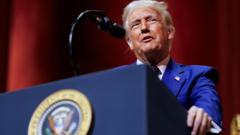The move has sparked significant debate about its implications for Sinn Féin's relationship with American political figures and the Irish diaspora while emphasizing Trump's controversial statements on global issues.
Sinn Féin's Bold Stance: Boycotting White House St. Patrick's Day Celebrations

Sinn Féin's Bold Stance: Boycotting White House St. Patrick's Day Celebrations
Sinn Féin's decision to boycott the White House St. Patrick's Day celebrations reflects growing tensions over US policies under Donald Trump.
Sinn Féin's recent decision to boycott the St. Patrick's Day celebrations at the White House marks a dramatic shift in its approach towards American relations, particularly in the wake of Donald Trump's provocative comments. This bold maneuver poses risks for the party, potentially straining ties with influential political figures in the US and alienating segments of the Irish diaspora, especially Trump supporters.
Traditionally, Northern Ireland's first and deputy first ministers attend these celebrations, but Sinn Féin's leadership felt compelled to act following Trump's inflammatory remarks regarding the Gaza Strip and his controversial stance on Ukraine's President, Volodymyr Zelensky.
Notably, Trump's pledge to transform Gaza into a resort-like environment was met with widespread international condemnation, including criticism from notable global leaders. His recent description of Zelensky as a "dictator" further exacerbated tensions within political circles, even among traditional supporters like the Democratic Unionist Party (DUP).
While mainstream parties tread cautiously in navigating their relationships with the Trump administration, Sinn Féin has taken a more assertive stance, encouraged by public backlash against Trump's comments. The announcement by Northern Ireland's First Minister Michelle O'Neill in Dublin underscores this approach, projecting political defiance towards unionist opponents, who may perceive this as a strategy directed from Dublin rather than Belfast.
As the focus now shifts to Deputy First Minister Emma Little-Pengelly, who expresses a willingness to engage in the Washington festivities, the implications of this internal dynamic may lead to tension within the joint ministerial role. If she proceeds to travel independently as the first minister opts out, the representation of Northern Ireland at the White House could emerge as a contentious issue, symbolizing deeper political divides while showcasing the evolving relationship between Sinn Féin and American politics.



















